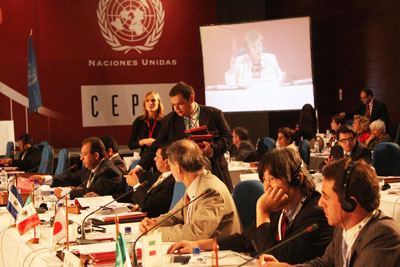Member States Approve ECLAC Proposals to Attain Greater Equality in Latin America and the Caribbean
Work area(s)
In their resolutions, delegates requested the Executive Secretariat to prepare new economic and social indicators that may reflect the reality of each country.

(Brasilia, 1 June 2010) The Economic Commission for Latin America and the Caribbean (ECLAC) concluded its Thirty-third Session today in Brazil, welcoming the comprehensive approach to development centered on equality proposed by the Executive Secretariat and requesting that it draft proposals of public policies under that perspective.
The representatives of ECLAC's 44 member and nine associate States met in Brasilia from 30 May to 1 June to review the activities of the Commission during the ongoing biennium and set the priorities of its programme of work for the following two years.
One of the most relevant resolutions approved today refers to South-South cooperation. The delegates to the Session requested the ECLAC Secretariat to prepare, in cooperation with other international and regional organizations, a broader set of indicators to reflect each country's specific reality, thus allowing to identify their main needs, so that the criteria of average income cease to be an impediment for participating in official development assistance.
They also shared in general terms the focus on development as set forth in the main working document, Time for equality: closing gaps, opening trails, and requested that the Executive Secretariat carry out studies and draft public policy proposals for economic and social development with this focus and in close cooperation with national policymakers.
The document addressed the current socio-economic situation in the region and the medium- and long-term challenges in terms of macroeconomic policies, structural heterogeneity and productivity gaps, territorial disparities and convergence, employment and labour institutions, social gaps and the role of the State and taxation.
The delegates to the Session approved resolutions in support of ECLAC's follow-up work on the compliance of the Millennium Development Goals and the implementation of agreements emanating from international conferences on economic and social issues, as well as the work of the Latin American and Caribbean Institute of Economic and Social Planning (ILPES), the Caribbean Development and Cooperation Committee and the Special Committee on Population and Development.
The representatives of member States expressed their satisfaction for the growing consolidation of ECLAC's Statistical Conference of the Americas as an intergovernmental coordinating body of international statistics activities in the region and in promoting more solid national statistics bureaus and systems. In addition, they manifested their desire that governments and political leaders in the region become more conscious of the need to develop national statistics systems that are technically independent, impartial and objective, ensuring resources to strengthen the legal and institutional frameworks needed to make it possible.
Finally, delegates to the Session were pleased with the progress made in the approval of the Quito Consensus of the Tenth Regional Conference on Women in Latin America and the Caribbean, highlighting the creation of the Observatory of Gender Equality for the region.
They also recommended that delegations to the Eleventh Regional Conference on Women in Latin America and the Caribbean to be held in Brasilia on 13-16 July take into account and promote gender parity in their composition.
The programme of work for ECLAC during the 2012-2013 biennium approved during the Session will focus on the following areas:
- Increase macroeconomic stability and improve policies to reduce vulnerability and mitigate the effects of economic and financial crises
- Strengthen the region's access to financing for development
- Contribute to improving the global, regional and national financial architecture
- Heighten the productive potential of the region and reduce productivity gaps, with special emphasis on innovation and new technologies
- Improve the region's position in the global economy through trade, cooperation and regional integration
- Promote a social covenant through greater social equality, lower social risks and further inclusion of a gender perspective in public policies
- Improve policies for sustainable development and energy efficiency and address the effects of climate change
- Improve the development of institutions that deal with the management of global and cross-border issues and the provision of public goods at a regional level
The delegates resolved to hold the Thirty-fourth Session of ECLAC in 2012 in El Salvador.
More information on the Thirty-third session of ECLAC is available on the webpage.
For enquiries and interviews, please contact ECLAC's Public Information and Web Services Section, dpisantiago@cepal.org; telephones: (56-2) 210-2040/2149. Mobile phones: (56 9) 88390573, (56-9) 7967-8306, (56-9) 8839-0576.
Related content

"The Time for Equality has Arrived"
The Brazilian Head of State spoke during the closing ceremony of ECLAC's Thirty-third Session in Brasilia.
Country(ies)
- Latin America and the Caribbean
Contact
Public Information Unit
- prensa@cepal.org
- (56 2) 2210 2040